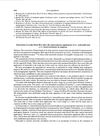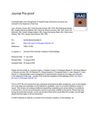 25 citations,
January 1983 in “Analyst”
25 citations,
January 1983 in “Analyst” Method measures minoxidil in tablets accurately and easily.
5 citations,
September 2021 in “Dermatologic Therapy” Oral minoxidil effectively treats female pattern hair loss and is a good alternative to topical minoxidil.
 18 citations,
January 1992 in “The Journal of emergency medicine”
18 citations,
January 1992 in “The Journal of emergency medicine” Minoxidil overdose caused heart changes, treated with stomach wash, charcoal, and IV fluids.
 80 citations,
October 1983 in “BMJ”
80 citations,
October 1983 in “BMJ” Minoxidil helps hair regrowth in alopecia patients, with 16 having good results and no side effects.
September 2024 in “Actas Dermo-Sifiliográficas” Sublingual minoxidil is a safe and effective treatment for hair loss, especially in women.
 397 citations,
February 2004 in “British Journal of Dermatology”
397 citations,
February 2004 in “British Journal of Dermatology” Minoxidil boosts hair growth by opening potassium channels and increasing cell activity.
 6 citations,
January 2021 in “Journal of The American Academy of Dermatology”
6 citations,
January 2021 in “Journal of The American Academy of Dermatology” Low-dose oral minoxidil can be effective for hair loss but should be avoided in people with certain heart conditions and severe liver problems.
 25 citations,
November 1987 in “British Journal of Dermatology”
25 citations,
November 1987 in “British Journal of Dermatology” Minoxidil didn't increase scalp blood flow for hair growth, but hexyl nicotinate did.
1 citations,
December 1995 in “Archives of Dermatology” The combination of topical minoxidil and oral finasteride improved hair regrowth in a man with advanced hair loss.
 May 2023 in “JAMA network open”
May 2023 in “JAMA network open” After a New York Times article talked about using low-dose oral minoxidil for hair loss, more people started getting this drug prescribed, but this trend didn't last long.
January 2022 in “Springer eBooks”  August 2023 in “Dermatology and Therapy”
August 2023 in “Dermatology and Therapy” Experts recommend personalized treatment plans for best outcomes in managing Alopecia Areata.
 25 citations,
February 1989 in “The Journal of Clinical Pharmacology”
25 citations,
February 1989 in “The Journal of Clinical Pharmacology” This document studied minoxidil in healthy volunteers. Minoxidil is quickly absorbed and eliminated from the body.
 19 citations,
September 1999 in “Talanta”
19 citations,
September 1999 in “Talanta” New method measures minoxidil concentration faster, more accurately, and automatically.
 12 citations,
May 1989 in “Postgraduate Medicine”
12 citations,
May 1989 in “Postgraduate Medicine” The document concludes that hair loss is common and can be treated with medications like minoxidil or surgical options, and it significantly affects people's psychological well-being.
 3 citations,
October 1988 in “Clinics in Dermatology”
3 citations,
October 1988 in “Clinics in Dermatology” Using 3% topical minoxidil can help women with hair loss, but more research is needed.
 11 citations,
April 2009 in “Pharmacotherapy”
11 citations,
April 2009 in “Pharmacotherapy” Minoxidil can cause deadly skin reaction; monitor patients closely.
 17 citations,
July 1995 in “International Journal of Dermatology”
17 citations,
July 1995 in “International Journal of Dermatology” Minoxidil helps prevent hair loss from chemotherapy in rats.
 23 citations,
December 1995 in “Archives of Dermatology”
23 citations,
December 1995 in “Archives of Dermatology” Combination therapy improves hair growth in advanced hair loss.
 January 2023 in “Skin appendage disorders”
January 2023 in “Skin appendage disorders” Low-dose oral minoxidil may help treat hair loss but is not FDA-approved and can cause side effects like unwanted hair growth and heart issues.
 7 citations,
September 2020 in “Journal of The American Academy of Dermatology”
7 citations,
September 2020 in “Journal of The American Academy of Dermatology” Low-dose oral minoxidil for hair loss can cause mild excessive hair growth, usually appearing within the first 3 months, but it can be managed by adjusting the dose or removing the unwanted hair, with most people not needing to stop the treatment.
 13 citations,
October 1993 in “International Journal of Dermatology”
13 citations,
October 1993 in “International Journal of Dermatology” Minoxidil effectively promotes hair regrowth in younger patients with small balding areas.
 5 citations,
January 2018 in “Javma-journal of The American Veterinary Medical Association”
5 citations,
January 2018 in “Javma-journal of The American Veterinary Medical Association” A dog fully recovered from minoxidil poisoning after receiving treatment.

Oral minoxidil is as effective and safe as topical minoxidil for treating female pattern hair loss.
January 2023 in “Journal der Deutschen Dermatologischen Gesellschaft” Early diagnosis and personalized treatment are crucial for managing hair loss in children.
 11 citations,
July 1988 in “International Journal of Dermatology”
11 citations,
July 1988 in “International Journal of Dermatology” The study found that using 2% minoxidil solution can help grow hair and is safe.
January 2023 in “Revista Eletrônica Acervo Saúde”  54 citations,
March 1987 in “Journal of The American Academy of Dermatology”
54 citations,
March 1987 in “Journal of The American Academy of Dermatology” 3% topical minoxidil effectively treats extensive alopecia areata with few side effects.
 34 citations,
January 1987 in “Dermatology”
34 citations,
January 1987 in “Dermatology” Topical minoxidil effectively and safely treats extensive alopecia areata but doesn't change its course.























